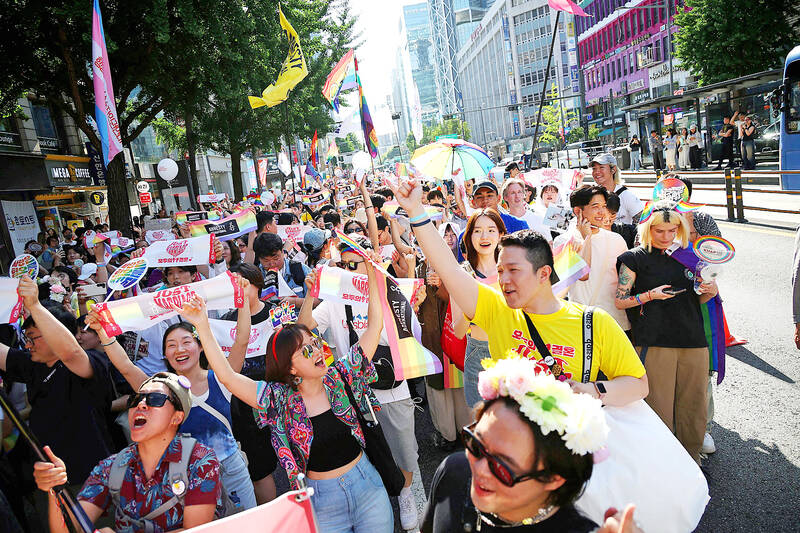Tens of thousands of LGBTQ South Koreans and their supporters yesterday gathered in central Seoul for annual Pride celebrations, despite the event’s traditional venue being banned by authorities for the second consecutive year.
Same-sex marriage remains unrecognized in Asia’s fourth-largest economy, and advocates have long emphasized the need for legislation outlawing discrimination on the basis of sexual orientation.
This year’s Pride Parade, marking its 25th anniversary and one of the largest in Asia, was denied permission to gather at the Seoul Plaza in front of city hall, where the main festivities have traditionally been held.

Photo: Reuters
Seoul Mayor Oh Se-hoon has said he “personally can’t agree with homosexuality,” but municipal authorities blamed a scheduling conflict and said the venue had already been reserved for an outdoor event themed around books.
It instead took place in the streets in central Seoul, with companies and organizations including the US embassy, IKEA and Amnesty International participating to show support.
Areas surrounding Seoul’s major thoroughfares Namdaemun-ro and Ujeongguk-ro were packed with excited participants wearing rainbow-themed costumes and makeup, some blowing bubbles and many waving orange balloons — the theme color for this year’s edition.
Pride organizers said that three other venues managed by the Seoul City Government, including the Seoul Museum of History, were also prohibited from being used for side events due to “causing social conflict.”
The authorities’ decision was “nonsensical,” but it does not diminish the pride that LGBTQ individuals feel for the annual event, participant Na Joo-youn said.
“I’m openly queer, which means I often have to fight for what I believe, which sometimes makes it hard to live as myself,” Na, 26, said. “Today, I get to enjoy being myself. Those who oppose the Pride Parade have been around for a long time, but whatever they do or say, they cannot erase our existence.”
Nearly one-quarter of South Korea’s 52 million population is Christian and churches remain a significant political arena, particularly for legislators.
In addition to the festival still facing difficulties in securing venues, attempts to pass laws banning discrimination on the basis of sexuality have languished since about 2007, with lawmakers coming under pressure from conservative and religious organizations.
“It would not be an exaggeration to say that the human rights of sexual minorities in South Korean society are regressing, [rather than meeting] the global standards,” said Hyeonju, one of the festival’s organizers.

POLITICAL PRISONERS VS DEPORTEES: Venezuela’s prosecutor’s office slammed the call by El Salvador’s leader, accusing him of crimes against humanity Salvadoran President Nayib Bukele on Sunday proposed carrying out a prisoner swap with Venezuela, suggesting he would exchange Venezuelan deportees from the US his government has kept imprisoned for what he called “political prisoners” in Venezuela. In a post on X, directed at Venezuelan President Nicolas Maduro, Bukele listed off a number of family members of high-level opposition figures in Venezuela, journalists and activists detained during the South American government’s electoral crackdown last year. “The only reason they are imprisoned is for having opposed you and your electoral fraud,” he wrote to Maduro. “However, I want to propose a humanitarian agreement that

Young women standing idly around a park in Tokyo’s west suggest that a giant statue of Godzilla is not the only attraction for a record number of foreign tourists. Their faces lit by the cold glow of their phones, the women lining Okubo Park are evidence that sex tourism has developed as a dark flipside to the bustling Kabukicho nightlife district. Increasing numbers of foreign men are flocking to the area after seeing videos on social media. One of the women said that the area near Kabukicho, where Godzilla rumbles and belches smoke atop a cinema, has become a “real

‘POINT OF NO RETURN’: The Caribbean nation needs increased international funding and support for a multinational force to help police tackle expanding gang violence The top UN official in Haiti on Monday sounded an alarm to the UN Security Council that escalating gang violence is liable to lead the Caribbean nation to “a point of no return.” Special Representative of the UN Secretary-General for Haiti Maria Isabel Salvador said that “Haiti could face total chaos” without increased funding and support for the operation of the Kenya-led multinational force helping Haiti’s police to tackle the gangs’ expanding violence into areas beyond the capital, Port-Au-Prince. Most recently, gangs seized the city of Mirebalais in central Haiti, and during the attack more than 500 prisoners were freed, she said.

DEMONSTRATIONS: A protester said although she would normally sit back and wait for the next election, she cannot do it this time, adding that ‘we’ve lost too much already’ Thousands of protesters rallied on Saturday in New York, Washington and other cities across the US for a second major round of demonstrations against US President Donald Trump and his hard-line policies. In New York, people gathered outside the city’s main library carrying signs targeting the US president with slogans such as: “No Kings in America” and “Resist Tyranny.” Many took aim at Trump’s deportations of undocumented migrants, chanting: “No ICE [Immigration and Customs Enforcement], no fear, immigrants are welcome here.” In Washington, protesters voiced concern that Trump was threatening long-respected constitutional norms, including the right to due process. The